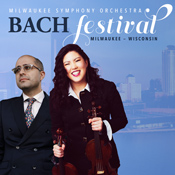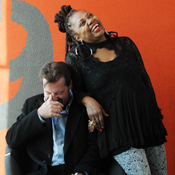
A Conversation with Adam Birnbaum
David Lewellen
PUBLISHED
Tagged Under: 2024.25 Season, Bach Festival, Guest Artist, Jazz, piano
As part of the Milwaukee Symphony’s second annual Bach Festival, the Adam Birnbaum Trio will present jazz arrangements of Bach’s preludes from his landmark keyboard collection The Well-Tempered Clavier in Allen-Bradley Hall on Wednesday, March 19. Birnbaum will perform on piano, accompanied by bassist David Wong and percussionist Keita Ogawa. He recently spoke with MSO Backstage writer David Lewellen about Bach, improvisation, and the state of classical and jazz performance.
Q. Tell me a little about your origin story as a jazz musician.
A. We had a piano in our house, and before I had formal lessons, I learned to pick out melodies by ear and improvise. Then when I was 12, I went to a classical piano summer camp, and we had to take a jazz class, and the teacher played a record by Miles Davis, and something clicked. I knew that was what I wanted to do.
Q. How did jazz evolve from nightclub music to something that’s taught in universities?
A. There was a brief period when academic jazz was separate from the performing experience, and that was a problem. Now, I teach at SUNY Purchase, and all the professors are performers first. You need the experience of playing to teach it. But it is primarily an aural tradition. Jazz is in a good place, with kids learning at a very high level at a very young age.
Q. How did your Bach project come about?
A. The Well-Tempered Clavier is like the Bible to many piano teachers, but the pieces sound like written-down improvisations. If Bach was still around, he would play them differently each time. So I wanted to bring the improvisational element back to Bach. We preserved the harmony as much as possible, but we changed the rhythm, dropping beats here and there, and Keita would lay down different grooves. We pick loops to repeat and improvise over it. It’s kind of like playing a standard that’s very familiar to people, but hearing a different take on something you know.
Q. Why did you do it for trio with bass and drums, instead of you as a soloist or a bigger ensemble?
A. The piano trio is the primary jazz format, and I wanted to honor that, but Keita doesn’t play like a traditional drum kit — he’s got a lot of different cymbals and things I don’t even know the names of. And using a bass frees me up because I don’t have to build the harmony from the bottom up. Being a soloist is hard because I have to do it all myself.
Q. As you said, Bach was famous for improvising, and so were many other classical musicians, up until maybe the early 19th century. And then, for better or for worse, things changed, and they started sticking much closer to the written music. Are there any signs of a revival of improvisation?
A. I’m going to go out on a limb and say the change was for worse. It’s a real shame. It didn’t used to be that different from jazz. But I think the trends are shifting. There’s more interest now in adding improvisation to classical performance, and there have always been a few people who could do it brilliantly.
Q. What made this concert happen? Do you remember who approached who?
A. I’ve known Ken-David Masur for years, because he leads the Chelsea Music Festival in New York, which combines different genres of music and visual arts and culinary events. That was how my Bach project started, because he asked me to do jazz versions of a few Bach preludes, and that led to the album. The timing didn’t work out for us to come to last year’s Bach festival, but this year we made it happen.
Q. The audience is going to be on the stage in Allen-Bradley Hall. Is that going to be a different kind of dynamic?
A. No, we’re used to playing in intimate settings. I haven’t seen the venue, but I’m looking forward to getting in there and seeing what it’s like.



